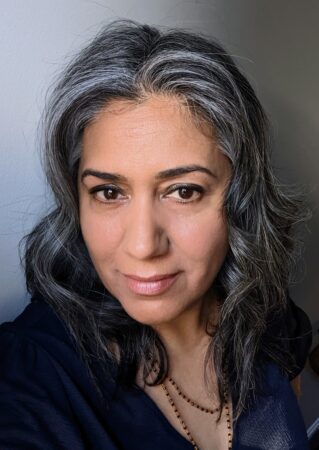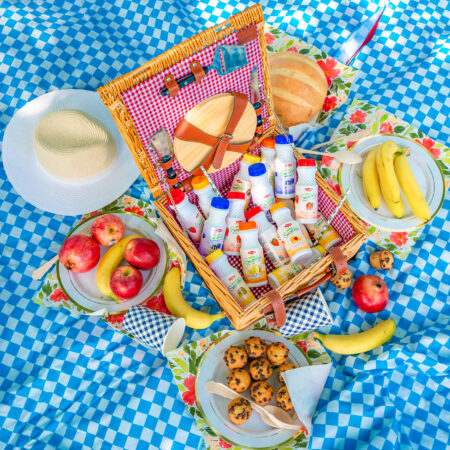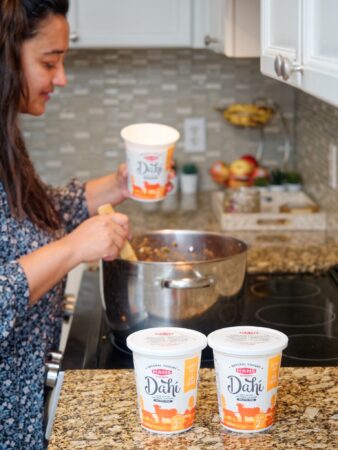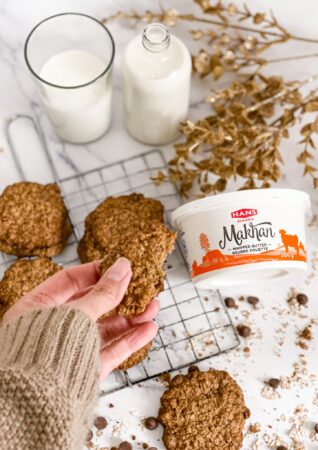
Sarab Hans’ rise to leadership in the dairy sector
By Nithya Caleb
Food In Canada In-Depth Women in Manufacturing Dairy Editor pick Hans Dairy Ontario Women in foodExplore how Hans Dairy’s president is breaking barriers and fostering diversity in food production
 Sarab Hans. Photos © Hans Dairy
Sarab Hans. Photos © Hans Dairy Sarab Hans is the president of Hans Dairy, a Mississauga, Ont.-based family business specializing in South Asian dairy products. The company was founded in 1997 by Sarab’s parents. She joined the company more than a decade ago and has steadily grown Hans Dairy from independent grocery stores and small mom-and-pop shops to big banner chains. Hans Dairy is now widely distributed across Ontario, a no small feat for a company that caters to a niche market of South Asian dairy consumers.
Hans Dairy makes yogurt products, smoothies, fluid milk for further processing, rice pudding, and a butter line. The company’s USP is its clean ingredient deck and taste that offers a home-made feel.
“Everything we buy is local. Our philosophy is 95 per cent of the ingredients, packaging, etc. are procured from Canadian companies. We try our hardest to sustain the circular economy here,” explains Sarab.

Hans Dairy specializes in South Asian dairy products.
Retirement plans delayed
The genesis of Hans Dairy is quite inspiring. In their 60s, an age when most people hang up their work boots, Sarab’s father, an engineer, and mother, a customer service representative, decided to do something for themselves.
As first-generation immigrants, they found limited food options, and nothing that tasted desi. They decided to create authentic Indian products that were just like the food they grew up with. Their flagship product was Indian-style yogurt or dahi, which, full disclosure, is a staple in the author’s home.
Sarab wanted to join the business after finishing university–she has a bachelor’s degree in political science from University of Western Ontario, London, Ont., and an MBA in finance and strategy from McGill University, Montreal. However, her parents refused to grant her a free pass. They instead asked her to work elsewhere and gain relevant experience. Therefore, Sarab worked in investment banking in New York, Tokyo, and Amsterdam.
When her parents were nearing 70 and wanted to retire, they asked Sarab to take over.
“At that time, the business was set up in bricks and mortar. We had the equipment. They had a customer base and I thought that if I don’t jump in now, I’m never going to have this opportunity again. So I gave my notice, moved back to Toronto into my parents’ home and started working with them,” recalls Sarab.

Indian-style yogurt or dahi was the first Hans Dairy product to launch in big box stores.
Not the owner’s daughter
The transition was not without challenges, but Sarab was laser-focused on growing Hans Dairy. She spent a year on the production floor, learning everything about dairy food/beverage production.
“I had to take my pasteurizer’s course and my grader’s certification. I was able to learn a lot about the various manufacturing elements like steam boilers, pneumatics, cleaning process, engineering, etc. This gave me a knowledge base that allowed me to then have conversations with people,” Sarab explains.
She also didn’t shy away from asking for help. “I think sometimes when we come into a position where we’re expected to be the leader, we feel like we need to show that we know everything, but when you don’t know everything, that is really the wrong way to approach it. So I asked when I needed to. People were very helpful, and I was surprised at how forthcoming they were with information. This way, I built a connection with people. They knew that I was here not to dictate what was going on, but to build the business from the down up,” she adds.
Sarab inherited a company with all male employees, predominantly from the South Asian community. Initially, it was challenging to get them to respond in the manner she wanted because they sometimes perceived her as the owner’s daughter and not the company’s head.
As a woman of South Asian origins, Sarab had to deal with certain unconscious biases. A patriarchal thinking that’s quite pervasive in South Asian communities assumes women would eventually stop working and become full-time moms. Sarab was often asked, “What is going to happen when you have children? Who is going to run your business?” As Sarab says, people thought Hans Dairy was almost her pet project, and “I was doing it part time until my ‘real life’ started, which was family, children, and household stuff. When someone views you in that perspective, they don’t take you seriously. Secondly, you’re not invited to those social gatherings where business deals happen or those connections are made, so that for sure has held us [women] back. But on the other end, maybe it gave us some extra steam to prove everybody wrong.”
Another challenge was finding mentors. It took her about 12 years to find good mentors. Thankfully, Sarab is now part of an organization of women CEOs, which has been supportive. The group meets monthly and helps members with whatever issues, such as HR and technology, they’re facing. She also has one-on-one mentors within the dairy industry who help her with business strategies. Sarab’s third source of mentors, and maybe the most precious one, are her family members and friends. Sarab’s sister Mandeep is also in the business; she’s the marketing director of Hans Dairy.
“Women need to support women that they affiliate with because that’s the only way we’re going to pull each other up. And that’s the only way we’re going to make it more of an equal playing field,” adds Sarab.

A clean ingredient deck and a homemade feel are hallmarks of Hans Dairy products.
Achievements
Slowly, but steadily, Sarab grew Hans Dairy. Her most memorable moment was in 2008 when the first sku of Hans Dairy Dahi was launched in big box chains.
“Finally we broke in. We’re in, and now we have a launching pad for a lot of other things,” she explains.
Her biggest achievement to-date would be building Hans Dairy’s current manufacturing facility. About eight years ago, the company hit capacity at the place they were in. They could either hire a co-packer or build a new plant. It was a difficult decision due to the risky investment, but they decided to buy a piece of land and build a facility that suited the company.
“It was such a great choice to have that space to expand in, to own it yourself. You can make any improvements and not be worried about having to move again,” says Sarab.
Diversifying the workforce
As mentioned earlier, Hans, largely, had male employees. Sarab has tried hard to diversify the workforce.
“If I wanted women to come into the manufacturing side and stay, I needed to make sure that I had at least two to three women because otherwise they felt a little isolated. Nobody was engaging with them. So, the work environment work wasn’t as fun as it should be,” she explains.
Hiring in pairs has paid off, as it’s almost a 50-50 split in the back for men and women. Hans Dairy has also implemented a referral program. “People that are here understand what the real work is at the factory. They refer people. Once the new people join, the employees who referred them get a bonus. That’s really helped us get good people,” explains Sarab.
Future plans
Hans Dairy is developing a buffalo yogurt line, a flavoured whipped butter line, and a Middle Eastern dairy product line, so watch out for these.
Advocacy
Besides running her company, Sarab is also an advocate for the industry, as a board member of Food and Beverage Ontario. She urges people who are interested in food manufacturing to simply ‘jump in.’
“I think that there’s room for everybody. When I joined the industry, one of my father’s friends gave me advice that ‘don’t steal market share, create it’. If you have a product that’s not available on the market and it’s unique and different, there’s tons of room in this country because we’re so multicultural. There are so many different, diverse appetites out there. It may take you longer than if you were making something that already existed, but there’s room for that,” she encourages.
She also asks women who are entering/joining family businesses to not fall into the supporting role.
“If you’re the leader, make sure you’re the leader. If there is someone in your organization, be it family that does not want to see you as a leader and is undermining your authority, you need to have that person pivot out or make sure they understand who’s the boss because you really do not want to be fighting personal battles in your business,” advises Sarab.
This article was originally published in the October 2023 issue of Food in Canada.
Print this page